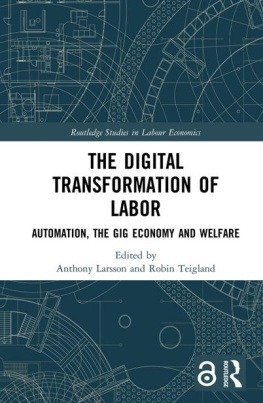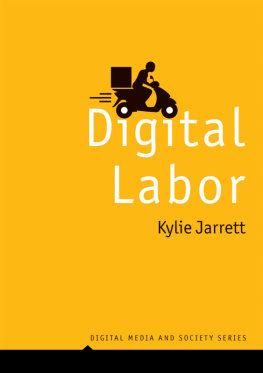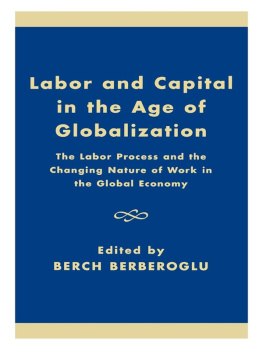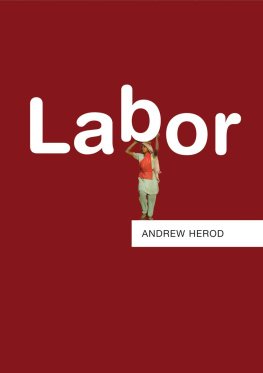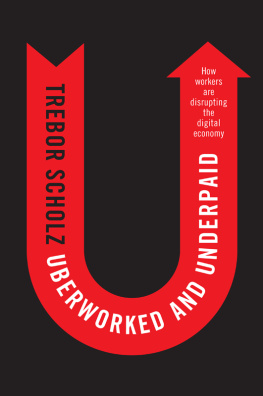Huws - Labor in the Global Digital Economy
Here you can read online Huws - Labor in the Global Digital Economy full text of the book (entire story) in english for free. Download pdf and epub, get meaning, cover and reviews about this ebook. year: 2014, publisher: Monthly Review Press, genre: Politics. Description of the work, (preface) as well as reviews are available. Best literature library LitArk.com created for fans of good reading and offers a wide selection of genres:
Romance novel
Science fiction
Adventure
Detective
Science
History
Home and family
Prose
Art
Politics
Computer
Non-fiction
Religion
Business
Children
Humor
Choose a favorite category and find really read worthwhile books. Enjoy immersion in the world of imagination, feel the emotions of the characters or learn something new for yourself, make an fascinating discovery.

Labor in the Global Digital Economy: summary, description and annotation
We offer to read an annotation, description, summary or preface (depends on what the author of the book "Labor in the Global Digital Economy" wrote himself). If you haven't found the necessary information about the book — write in the comments, we will try to find it.
Huws: author's other books
Who wrote Labor in the Global Digital Economy? Find out the surname, the name of the author of the book and a list of all author's works by series.
Labor in the Global Digital Economy — read online for free the complete book (whole text) full work
Below is the text of the book, divided by pages. System saving the place of the last page read, allows you to conveniently read the book "Labor in the Global Digital Economy" online for free, without having to search again every time where you left off. Put a bookmark, and you can go to the page where you finished reading at any time.
Font size:
Interval:
Bookmark:
Labor in the Global Digital Economy
DIGITAL ECONOMY
The Cybertariat Comes of Age
by URSULA HUWS

Copyright 2014 by Ursula Huws
All Rights Reserved
Library of Congress Cataloging-in-Publication Data available from the publisher.
978-1-58367-463-5 pbk
978-1-58367-464-2 cloth
Typeset in Minion Pro 11/14
Monthly Review Press
146 West 29th Street, Suite 6W
New York, New York 10001
www.monthlyreview.org
5 4 3 2 1
The Destruction of Occupational Identities in
the Knowledge-Based Economy
Work, Identity, and the Spatial Division of Labor in
the Twenty-First-Century City
4. THE GLOBALIZATION OF LABOR AND THE ROLE
OF NATIONAL GOVERNMENTS
In 2003, Monthly Review Press published a collection of my essays dating back to the late 1970s under the title The Making of a Cybertariat: Virtual Work in a Real World. This collection continues where that one left off, bringing together essays written between 2006 and 2013, a tumultuous period in the history of capitalism and the organization of labor.
In the earlier collection, one of my central themes was capitalisms extraordinary ability to survive the crises that periodically threaten to destroy it by generating new commodities. Just at the point when its logic of expansion seems destined to generate a saturation of markets and a consequent crisis of profitability, it finds fresh areas of life to bring within its scope, generating new forms of production of new goods and services for which new markets can be created. These phases are often associated with the diffusion of new technologies. In the early twentieth century, for instance, the spread of electricity gave rise to a wave of new commodity development based on domestic labor (such as vacuum cleaners, washing machines, and refrigerators) or entertainment (such as radios, film projectors, or phonographs and the films and records that provided them with content). In the process novel forms of production were generated, but so too were novel forms of consumption. While new kinds of paid work were created, domestic labor was increasingly transformed into what I termed consumption work, sucking ever more activities out of the private sphere of direct interpersonal interaction and bringing them into a public marketplace. The more workers become dependent on these new commodities to survive from one day to the next, the greater their need for a source of income to pay for them, tightening capitalisms grasp on their lives still further. Yet such innovations are, on the whole, adopted willingly and enthusiastically. There is an almost irresistible appeal in their novelty, modernity, and convenience, their increasing cheapness, the promise they hold out of saving time and labor, and the lure of possessing something that was previously a luxury only the rich could afford. And those who do resist, positioning themselves thereby as old-fashioned, technologically inept, conservative, or even Luddite, quickly find that so many features of social and economic life are designed on the assumption that everyone now has these new commodities that survival without them becomes ever more difficult. The last volume charted some of the impacts of these developments on labor, both paid and unpaid, in a context in which capitalism was not only expanding in terms of the areas of life it embraced, but also in its geographical scope.
We have now entered a period, I argue here, when new waves of commodification set in motion in earlier periods are reaching maturity. The new commodities have been generated by drawing into the market even more aspects of life that were previously outside the money economy, or at least that part of it that generates a profit for capitalists. Several such fields of accumulation have now emerged, each with a different method of commodity genesis, forming the basis of new economic sectors and exerting distinctive impacts on daily life, including labor and consumption. They include biology, art and culture, public services, and sociality.
I use the term biology to refer to the way that life itself, in the form of plants and animals and the DNA that makes them up, is exploited to produce commodities such as new drugs and genetically engineered forms of food. This is a vast and expanding field, with huge implications for many aspects of life. I mention it only in passing and do not go into detail here, because, although I believe it to be very important, I have done no research in this area and have little to add to the interesting debates taking place elsewhere. I concentrate now on three other fields: art and culture, public services, and sociality.
The commodification of art and culture is the continuation of a process with a long history. Artistic work has been paid labor for centuries, and cultural commodities also have a long pedigree, produced under a variety of social and contractual conditions. What has changed in recent years has been the scale of their incorporation into capitalist productive relations, the concentration of capital in these sectors, and the introduction of a global division of labor into the production of cultural commodities. The concentration of ownership among a few transnational companies has been encouraged by technological developments that have enabled a convergence between activities that were formerly dispersed across different industries. Newspaper and book publishing, television, film, record, and games production, and other content-generating industries have merged seamlessly with each other and with distribution companies and infrastructure providers to create corporate behemoths that bestraddle a wide range of activities, interlinking the efforts of creative workers with many other technical, clerical, managerial, and service workers across the globe in ever-changing configurations. I analyze creative work at greater length in .
In the late twentieth century, the income and working conditions of writers, film-makers, musicians were largely dictated by the terms they could negotiate with vertically organized film companies, record companies, and publishers whose profits were directly linked to the sale or distribution of commodities such as films, records, CDs, books, and magazines. Now the markets are increasingly dominated by companies that produce hardware .
The commodification of public services has followed a rather different route, although there are strong connections and traces the development of the commodification of public services, linking it to the global restructuring of value chains that is described in earlier chapters.
It is perhaps my next category of new commodification, sociality, that is the most mind-boggling in its implications when considered as the basis of new commodities and new industries. The human needs to flirt and talk and share jokes and commiserate and keep in touch with friends and family must have seemed to our ancestors to be as basic as the needs for animals to nuzzle up to one another. Surely, they would have thought, these must be impervious to the hard cold laws of capitalism; how could they possibly provide a source for corporate profit? I suspect that many people still cling to an idea that their personal relationships lie in a private realm of affect and authenticity beyond the reach of the market. Yet the most cursory glance at almost any group of people in almost any social situation in the developed world shows how illusory such notions now are.
Here are just four snapshots drawn, more or less at random, from my own recent observations.
Next pageFont size:
Interval:
Bookmark:
Similar books «Labor in the Global Digital Economy»
Look at similar books to Labor in the Global Digital Economy. We have selected literature similar in name and meaning in the hope of providing readers with more options to find new, interesting, not yet read works.
Discussion, reviews of the book Labor in the Global Digital Economy and just readers' own opinions. Leave your comments, write what you think about the work, its meaning or the main characters. Specify what exactly you liked and what you didn't like, and why you think so.

